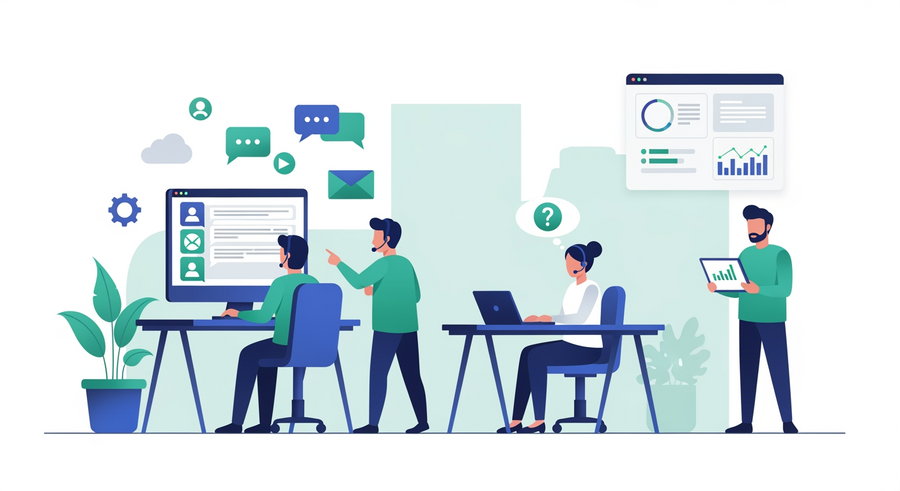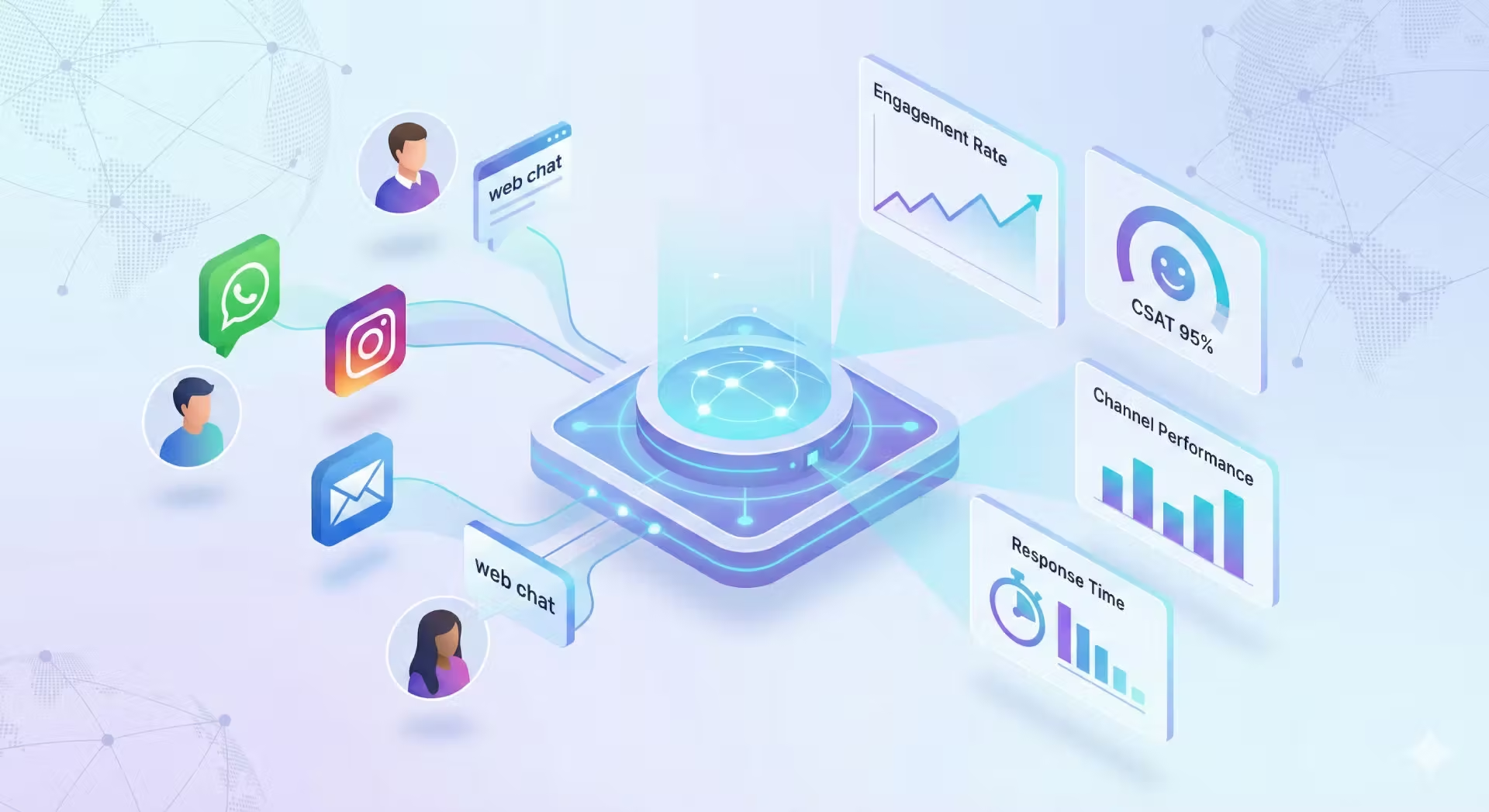According to Deloitte’s 2023 Customer Service Report, customers most often engage with customer service to report an issue or to find product or service-related information. Highlighting the importance of providing customers with easily accessible tools. Plus as everyone working in customer service and success knows, customer expectations are higher than ever.
So yes, we like tools that make customer contact a lot easier for the service and success teams. Thankfully there is the customer service bot. These digital assistants transform how your business interacts with its customers. They offer efficiency, scalability, and personalised service that traditional support channels struggle to match.
In this article, we explore the importance and benefits of customer service bots and how customer engagement platforms are improving customer interactions and making customer delight more accessible to hardworking teams.
What is a customer service bot?
A chatbot for customer service is an artificial intelligence (AI) or automated program designed to simulate conversations with people online. These bots are programmed to understand and respond to a wide range of customer queries. They provide instant support without the need for human intervention.
Bots work across a range of channels. This includes websites, social media platforms, and messaging apps. With multiple channels, you ensure that customers receive quick assistance regardless of how they choose to reach out.
How does a customer service bot work?
At its core, a customer service bot works by leveraging technologies. For example Natural Language Processing (NLP) and machine learning (ML).
NLP lets bots understand and interpret human language. This enables them to respond in a way that feels natural to the user. ML, on the other hand, helps chatbots learn from interactions over time. This continuously improves their responses and effectiveness.
The basic capabilities of customer service bots typically include:
- answering frequently asked questions (FAQs);
- providing product information;
- assisting with transactions;
- navigating users through websites.
Advanced customer service bots can also:
- personalise conversations by looking at past interactions;
- make recommendations based on user preferences;
- handle complex customer service issues that would traditionally require human support.
5 benefits of a customer service bot
Integrating customer service bots offers many benefits that can enhance the customer experience. It should then come as no surprise that chatbots are the main focus of investment for companies surveyed by Deloitte, with 40% wanting to invest in bots.
1. 24/7 availability
One major benefit of customer service bots is their ability to provide 24/7 support. Unlike human agents, bots don't need breaks, sleep, or holidays. This constant availability is great for businesses with a global customer base across different time zones.
2. Instant response
Speed is closely tied to providing great customer service. It’s so important that the Deloitte report shows that reducing customer service response time is the top priority for 56% of businesses. Customers expect quick answers to their questions and support bots can deliver instant responses. This rapid response can improve customer satisfaction which, in turn, is likely to improve sales.
3. Scalability
Bots can handle many questions all at once without compromising the quality of service. This scalability allows businesses to manage increases in customer inquiries. This is useful during product launches or seasonal peaks, where you can maintain your customer service without increasing the number of support staff. Plus any increase in conversations won't put a pressure on the quality of service anymore. All conversations, no matter the number, are handled with care.
4. Cost efficiency
Customer service bots can lead to big cost savings. When you can automate routine conversations and tasks with support chatbots you can reduce the workload on your customer service team. This allows them to focus on harder and high-value tasks.
5. Fewer mistakes
A human customer service team member can sometimes make mistakes. Especially when they are dealing with a high volume of inquiries. A well-programmed bot that gives accurate information can reduce the likelihood of errors in customer service interactions. This keeps customers happy and improves the quality of your support.
5 key features of effective customer service bots
For customer service bots to truly improve the customer experience, they must possess certain key features. These features enable chatbots to interact with users in a meaningful way.
1. Natural Language Processing (NLP)
At the heart of any effective bot is its ability to understand and process the messages it receives. NLP allows bots to interpret various user inputs, including slang and colloquial language. It can then respond in a way that mimics human conversation. This capability is crucial for creating interactions that feel natural and engaging to users.
2. Integration capabilities
An effective bot should easily integrate with your existing software systems. For example, CRM platforms, databases, and e-commerce systems. Integration enables your chatbots to access and retrieve relevant information. For example, this could be customer data that helps it provide personalised and contextually appropriate answers to a specific customer's questions.
3. Security and compliance
Given the sensitive nature of some customer interactions, for example, those in the Financial Services industry, bots must meet the security standards of the region they operate in. In addition, for almost every industry you will need to comply with data protection regulations of your country. This ensures that customer information is handled securely and that your business remains compliant with laws such as GDPR.
4. Multichannel support
With many customers engaging with businesses across multiple platforms, a good bot must operate across various channels. For example, your bot may need to seamlessly provide support on Facebook Messenger, your websites, and WhatsApp.
A HubSpot survey of more than 120 consumers found that 64% regularly use social media messaging, such as Instagram Messenger, WhatsApp, or Facebook DMs to get in contact with service teams. By providing a bot across social platforms you can ensure that customers receive the same quality of service, regardless of how they choose to interact with your business.
5. Customisation
The best chatbots offer you the ability to customise your responses. You can then tailor your bot's responses, personality, and appearance to align with your brand identity. For example, if you book luxury vacations for VIP groups, you may want a more formal tone. Whereas if you have an ecommerce store that sells clothing to teenage girls you probably want to be more informal and include slang or colloquial language.
3 of the best customer bot examples
Here are three standout examples of businesses that have successfully integrated a bot into their customer service strategy.
1. Domino’s Pizza Tracker
Domino's Pizza has long been at the forefront of customer experience innovation. The introduction of the Domino’s Pizza Tracker in 2008 marked a significant milestone for the company.
This dedication to enhancing the customer journey continues with their bots. The Domino’s bot simplifies the ordering process, allowing customers to place and track their orders without the need to download an app or sign up for an account.
This seamless experience encourages repeat orders by making it easy for customers to order their favourite pizza whenever they want it.
2. Solar Concept’s customer support bot
Solar Concept was searching for a solution to engage with their customers more effectively after the sale and improve their online customer ratings.
They found that Trengo not only met these initial needs but also provided invaluable support for their customer service team by centralising all customer communications.
With Trengo, Solar Concept’s team can access all necessary customer information in one place, eliminating the need to switch between different platforms. This has enabled them to manage nearly 10,000 conversations per month efficiently. In turn, this has significantly improved their customer satisfaction score to an impressive 8.9/10 amidst increasing competition in the solar energy market.
3. Corelle Dishware’s Facebook bot
Corelle Dishware is celebrated for its combination of beauty and durability, a description that also fits their Facebook customer service bot. The bot enhances transparency by clearly identifying itself as a bot while managing customer expectations about human support availability.
If customers choose to interact with the bot, they are presented with four options: “order support,” “product support,” “shopping help,” and “feedback.” This structured approach allows for quick resolutions to simple issues around the clock, freeing up the team to to tackle more complex queries that require a personal touch.
How to choose the right customer service bot for your business
There are so many bot options available right now. It can be overwhelming when you want to choose one. Many business are left wondering how to use bot in an effective way that impacts the bottomline. So here is a quick guide with several key factors to consider to ensure you choose a bot solution for your business.
1. Understand what your business needs
Before looking at the wide variety of bot solutions, take a step back to assess your specific needs.
Are you looking for a bot to:
- answer FAQs;
- provide 24/7 support;
- handle transactions;
- give personalised service or shopping recommendations.
When you've figured out the goal of your bot you will be in a better position to select a tool that meets your business goals.
2. Evaluate integration capabilities
Consider how well the bot integrates with your existing technology stack. Think about your CRM platforms, e-commerce systems, and social media channels. Seamless integration ensures that your bot can access the necessary information to provide personalised and efficient customer support.
3. Asses multichannel support options
Ensure the bot supports all the channels your customers use to communicate with your business, such as email, SMS, web, and social media. This omnichannel approach ensures a consistent and unified customer experience wherever your customers spend time.
4. Consider analytics and reporting
Analytics help you understand chatbot performance and customer needs. Choose a bot that provides detailed analytics and reporting features. These will help you gain insights into things like:
- customer interactions;
- identify trends;
- product issues;
- customer priorities.
You can then use this data to make informed decisions to improve service.
5. Read testimonials and case studies
Learn from others' experiences by seeking out testimonials and case studies from businesses similar to yours. These insights can provide valuable information about the bots's performance, reliability, and the level of support provided by the vendor.
The challenges of using a customer service bot
Customer service bots offer numerous benefits. However, integrating them into your customer service strategy comes with its own set of challenges.
1. Balance automation and human touch
A key challenge of bots is finding the right balance between automated responses and human interaction. While chatbots can handle routine inquiries efficiently, they may not always provide the empathy needed for complex or sensitive problems.
It’s important to 'train' your bot, personalise the input and find the balance and ensure a seamless handoff to human agents when necessary. This maintains an empathetic customer experience.
💡 Looking for personalisation templates that you can easily implement into your bot, or other parts of your customer journey?
Simply pick and choose from the personalisation database.
2. User adoption and adaptation
Encouraging customers to use and adapt to interacting with bots is another challenge. You need to design a user-friendly chatbot interface and educate customers on the benefits to encourage use.
3. Cultural and language differences
For businesses operating internationally, accommodating multiple languages and cultural differences can be challenging. Developing multilingual bots with an understanding of cultural contexts is essential for global businesses to provide good customer support.
Spotlight on Trengo: a leading customer service bot solution
Trengo offers a comprehensive range of tools to streamline communication and enhance customer engagement.
Here’s a closer look at why Trengo is considered a leading customer service bot solution.
1. Omnichannel capability
Whether it's social media, email, SMS, or live chat, Trengo ensures that no customer query goes unanswered. You can give a seamless experience across channels for both customers and your service teams.
2. Advanced automation and personalisation
Trengo bots are not just about answering FAQs; they offer personalised interactions by analysing customer data and previous interactions. This level of personalisation enhances the customer experience and makes each chat feel tailored and relevant.
3. Easy integration
Trengo's platform is designed to integrate with a variety of tools and systems. From CRM software to e-commerce platforms, and productivity tools we have you covered. This seamless integration means you can access and use customer data across systems.
4. Scalability
Trengo’s solutions are scalable. They are designed to grow with your business and handle increasing volumes of interactions without compromising performance.
5. Real-time analytics and reporting
Get valuable insights into customer interactions and bot performance. This data allows companies to make data-driven decisions.
6. Commitment to security and compliance
Security and data protection are important in today’s digital world. Trengo is committed to maintaining the highest standards of data security and compliance with regulations like GDPR. You can trust Trengo to handle customer data with care and integrity.
7. Proven success
Trengo’s impact is evident in its success stories. Businesses across various industries experience improved efficiency, higher customer satisfaction scores, and significant cost savings. Companies like Solar Concept have used Trengo’s bots to improve their customer service with impressive results.
8. Continuous innovation
Trengo is dedicated to staying at the forefront of customer service technology. The platform continuously evolves. We incorporate the latest advancements in AI and ML to enhance our bot solutions.
The future of customer service bots
The future of customer service bots points towards an increasingly important role in the customer service world. As technology continues to evolve, the capabilities of chatbots are expected to expand. Here are some trends and advancements we expect to shape the future.
1. Greater personalisation
With access to more data and improved analytics, bots can improve personalisation. They will be able to anticipate customer needs, give recommendations, and remember past interactions.
2. Emotional intelligence
Emerging technologies will enable bots to detect and respond to human emotions. This will create more empathetic interactions. By recognizing a customer's mood and adjusting responses accordingly, bots will provide a more supportive customer experience.
3. Better problem solving
Future chatbots will not only provide information but also resolve complex issues on their own. Integration with backend systems will lead to bots performing tasks such as
- processing returns
- scheduling appointments
- resolving billing issues
High-quality customer service starts with bots
For businesses who want to stay competitive and meet the needs of modern consumers, bot technology is not just an option but a necessity.
Improve the quality of your customer service and try Trengo today. Our customer service bot platform makes it easy to streamline all conversations and QA checks based on both team and automation efforts.




.png)











